文章目录
paddle2.0高层API快速实现LeNet(MNIST手写数字识别)
『深度学习7日打卡营·快速入门特辑』
零基础解锁深度学习神器飞桨框架高层API,七天时间助你掌握CV、NLP领域最火模型及应用。
- 掌握深度学习常用模型基础知识
- 熟练掌握一种国产开源深度学习框架
- 具备独立完成相关深度学习任务的能力
- 能用所学为AI加一份年味
DL万能公式

import paddle
import numpy as np
import matplotlib.pyplot as plt
paddle.__version__
'2.0.0'
数据加载和预处理
import paddle.vision.transforms as T
# 数据加载和预处理
# [0-255] -> [0-1]
transform = T.Normalize(mean=[127.5], std=[127.5])
# 训练数据集
train_dataset = paddle.vision.datasets.MNIST(mode='train', transform=transform)
# 评估数据集
eval_dataset = paddle.vision.datasets.MNIST(mode='test', transform=transform)
print(f"训练集样本量:{len(train_dataset)},验证集样本量:{len(eval_dataset)}")
训练集样本量:60000,验证集样本量:10000
查看数据
%matplotlib inline
plt.figure()
plt.imshow(train_dataset[0][0].reshape([28, 28]), cmap=plt.cm.binary)
plt.show()
print("label:", train_dataset[0][1])
print("data shape:", train_dataset[0][0].shape)
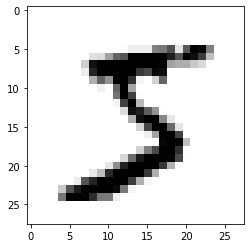
label: [5]
data shape: (1, 28, 28)
搭建LeNet-5卷积神经网络
选用LeNet-5网络结构。
LeNet-5模型源于论文“LeCun Y, Bottou L, Bengio Y, et al. Gradient-based learning applied to document recognition[J]. Proceedings of the IEEE, 1998, 86(11): 2278-2324.”,
论文地址:https://ieeexplore.ieee.org/document/726791
扫描二维码关注公众号,回复:
12459565 查看本文章



每个阶段用到的Layer

# 网络搭建
net = paddle.nn.Sequential(
('C1', paddle.nn.Conv2D(in_channels=1, out_channels=6, kernel_size=3, padding=1, stride=1)),
# 6x28x28
('ReLU1', paddle.nn.ReLU()),
('S2', paddle.nn.MaxPool2D(kernel_size=2, stride=2, ceil_mode=True)),
# 6x14x14
('C3', paddle.nn.Conv2D(6, 16, kernel_size=5, stride=1, padding=0)),
# 16x10x10
('ReLU2', paddle.nn.ReLU()),
('S4', paddle.nn.MaxPool2D(kernel_size=2, stride=2, ceil_mode=True)),
# 16x5x5
('C5', paddle.nn.Conv2D(16, 120, kernel_size=5, stride=1, padding=0)),
# 120x1x1
('ReLU3', paddle.nn.ReLU()),
('ReLU4', paddle.nn.Flatten()),
# 120
('F6', paddle.nn.Linear(120, 84)),
# 84
('ReLU5', paddle.nn.ReLU()),
('OUTPUT', paddle.nn.Linear(84, 10))
)
网络模型可视化
# 模型封装
model = paddle.Model(net)
# 模型可视化
model.summary((8, 1, 28, 28)) # n c h w
---------------------------------------------------------------------------
Layer (type) Input Shape Output Shape Param #
===========================================================================
Conv2D-1 [[8, 1, 28, 28]] [8, 6, 28, 28] 60
ReLU-1 [[8, 6, 28, 28]] [8, 6, 28, 28] 0
MaxPool2D-1 [[8, 6, 28, 28]] [8, 6, 14, 14] 0
Conv2D-2 [[8, 6, 14, 14]] [8, 16, 10, 10] 2,416
ReLU-2 [[8, 16, 10, 10]] [8, 16, 10, 10] 0
MaxPool2D-2 [[8, 16, 10, 10]] [8, 16, 5, 5] 0
Conv2D-3 [[8, 16, 5, 5]] [8, 120, 1, 1] 48,120
ReLU-3 [[8, 120, 1, 1]] [8, 120, 1, 1] 0
Flatten-1 [[8, 120, 1, 1]] [8, 120] 0
Linear-1 [[8, 120]] [8, 84] 10,164
ReLU-4 [[8, 84]] [8, 84] 0
Linear-2 [[8, 84]] [8, 10] 850
===========================================================================
Total params: 61,610
Trainable params: 61,610
Non-trainable params: 0
---------------------------------------------------------------------------
Input size (MB): 0.02
Forward/backward pass size (MB): 0.90
Params size (MB): 0.24
Estimated Total Size (MB): 1.16
---------------------------------------------------------------------------
{'total_params': 61610, 'trainable_params': 61610}
模型配置
- 优化器:SGD
- 损失函数:交叉熵(cross entropy)
- 评估指标:Accuracy
# 配置优化器,损失函数,评估指标
model.prepare(optimizer=paddle.optimizer.Adam(learning_rate=0.001, parameters=net.parameters()),
loss=paddle.nn.CrossEntropyLoss(),
metrics=paddle.metric.Accuracy())
# 启动模型全流程训练
model.fit(train_data=train_dataset,
eval_data=eval_dataset,
batch_size=64,
epochs=5,
verbose=1,
shuffle=True)
The loss value printed in the log is the current step, and the metric is the average value of previous step.
Epoch 1/5
D:\Anaconda3\envs\paddle2\lib\site-packages\paddle\fluid\layers\utils.py:77: DeprecationWarning: Using or importing the ABCs from 'collections' instead of from 'collections.abc' is deprecated since Python 3.3,and in 3.9 it will stop working
return (isinstance(seq, collections.Sequence) and
step 938/938 [==============================] - loss: 0.0460 - acc: 0.9391 - 14ms/step
Eval begin...
The loss value printed in the log is the current batch, and the metric is the average value of previous step.
step 157/157 [==============================] - loss: 0.0032 - acc: 0.9759 - 11ms/step
Eval samples: 10000
Epoch 2/5
step 938/938 [==============================] - loss: 0.0375 - acc: 0.9801 - 14ms/step
Eval begin...
The loss value printed in the log is the current batch, and the metric is the average value of previous step.
step 157/157 [==============================] - loss: 0.0014 - acc: 0.9863 - 8ms/step
Eval samples: 10000
Epoch 3/5
step 938/938 [==============================] - loss: 0.0199 - acc: 0.9850 - 13ms/step
Eval begin...
The loss value printed in the log is the current batch, and the metric is the average value of previous step.
step 157/157 [==============================] - loss: 0.0128 - acc: 0.9847 - 15ms/step
Eval samples: 10000
Epoch 4/5
step 938/938 [==============================] - loss: 0.0043 - acc: 0.9884 - 21ms/step
Eval begin...
The loss value printed in the log is the current batch, and the metric is the average value of previous step.
step 157/157 [==============================] - loss: 0.0019 - acc: 0.9836 - 8ms/step
Eval samples: 10000
Epoch 5/5
step 938/938 [==============================] - loss: 0.0069 - acc: 0.9914 - 14ms/step
Eval begin...
The loss value printed in the log is the current batch, and the metric is the average value of previous step.
step 157/157 [==============================] - loss: 2.2102e-04 - acc: 0.9884 - 14ms/step
Eval samples: 10000
模型评估
result = model.evaluate(eval_dataset, verbose=1)
print(result)
Eval begin...
The loss value printed in the log is the current batch, and the metric is the average value of previous step.
step 10000/10000 [==============================] - loss: 2.0623e-05 - acc: 0.9884 - 4ms/step
Eval samples: 10000
{'loss': [2.0622994e-05], 'acc': 0.9884}
模型预测
批量预测
使用model.predit接口完成对大量数据集的批量预测
result = model.predict(eval_dataset)
# 定义画图方法
def show_img(img, predict):
plt.figure()
plt.title('predict:{}'.format(predict))
plt.imshow(img.reshape([28, 28]), cmap=plt.cm.binary)
plt.show()
# 抽样展示
indexs = [2, 15, 38, 211]
for idx in indexs:
show_img(eval_dataset[idx][0], np.argmax(result[0][idx]))
Predict begin...
step 10000/10000 [==============================] - 4ms/step
Predict samples: 10000
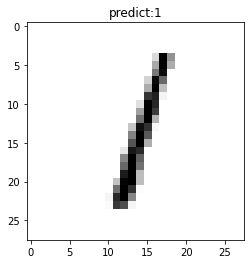
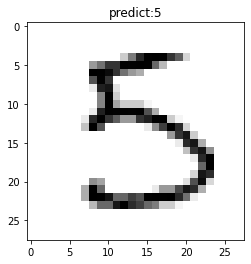
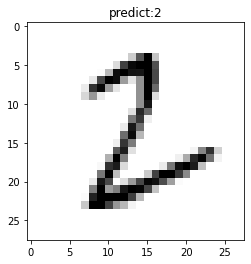
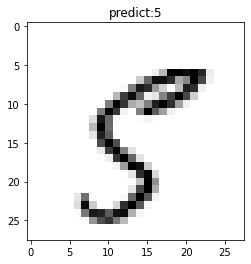
单张图片预测
采用model.predict_batch来进行单张或者少量多张图片的预测。
# 读取单张图片
img = eval_dataset[233][0]
result = model.predict_batch([img[np.newaxis, ...]]) # 需要多添加一个batch轴,不然报错
print(result)
show_img(img, np.argmax(result))
[array([[-3.4706905, -6.674865 , -1.9018929, 3.8094432, -5.66697 ,
1.5752668, -6.6928353, -2.2028043, 9.449063 , 3.296681 ]],
dtype=float32)]
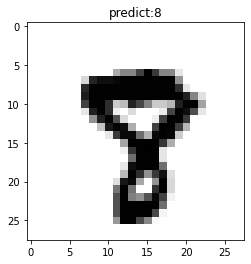
部署上线
保存模型
model.save('finetuning/mnist', training=True)
继续调优训练
from paddle.static import InputSpec
model_2 = paddle.Model(net, inputs=[InputSpec(shape=[-1, 1, 28, 28], dtype='float32', name='image')])
model_2.load('./finetuning/mnist')
# 配置优化器,损失函数,评估指标
model_2.prepare(optimizer=paddle.optimizer.Adam(learning_rate=0.0001, parameters=net.parameters()),
loss=paddle.nn.CrossEntropyLoss(),
metrics=paddle.metric.Accuracy())
# 启动模型全流程训练
model_2.fit(train_data=train_dataset,
eval_data=eval_dataset,
batch_size=64,
epochs=1,
verbose=1)
The loss value printed in the log is the current step, and the metric is the average value of previous step.
Epoch 1/1
step 938/938 [==============================] - loss: 3.6613e-04 - acc: 0.9966 - 13ms/step
Eval begin...
The loss value printed in the log is the current batch, and the metric is the average value of previous step.
step 157/157 [==============================] - loss: 7.5415e-05 - acc: 0.9908 - 9ms/step
Eval samples: 10000
保存预测模型
model_2.save('./infer/mnist', training=False)